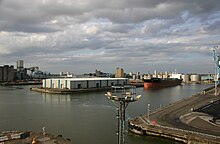Gladstone Dock
| Gladstone Dock | |
|---|---|

An overview of Gladstone Dock in June 2009
|
|
| Location | |
| Location | Bootle, Liverpool, United Kingdom |
| Coordinates | 53°27′18″N 3°01′08″W / 53.4549°N 3.0189°WCoordinates: 53°27′18″N 3°01′08″W / 53.4549°N 3.0189°W |
| OS grid | SJ323958 |
| Details | |
| Owner | The Peel Group |
| Operator | Mersey Docks and Harbour Company |
| Opened | 1927 |
| Type | Wet dock |
| Purpose | Cargo transfer |
| Joins | |
| Entries | 3 |
| Gates | 3 pairs |
| Area | 58 acres (23 ha) (as built) |
| Width at entrance | 130 ft (40 m) |
| Quay length | 3 mi (4.8 km) |
| Cargo type | |
| Transport links |
|
Gladstone Dock is a dock on the River Mersey, England, and part of the Port of Liverpool. It is situated in the northern dock system in Bootle. The dock is connected to Seaforth Dock to the north and what remains of Hornby Dock to the south. Part of Liverpool Freeport, Gladstone Dock is operated by the Mersey Docks and Harbour Company.
The dock is named after Robert Gladstone, a merchant from Liverpool and second cousin of Prime Minister William Ewart Gladstone. Designed in the first decade of the twentieth century, construction was eventually completed in 1927 and consisted of 3 mi (4.8 km) of quays and extensive warehouse space.
The graving dock was completed in 1913, before the rest of the dock became operational. At 1,050 ft (320 m) long and 120 ft (37 m) wide it was designed to take the largest trans-Atlantic steamers. The graving dock has since been converted into a wet dock (Gladstone Number Three Branch Dock).
Gladstone Dock lock entrance is one of the two remaining operational river entrances in the northern dock system. Measuring 1,070 ft (330 m) long and 130 ft (40 m) wide, wider and longer than the Panama Canal locks, it provides maritime access to the container terminal of Royal Seaforth Dock, which opened in 1972.
At the outbreak of the First World War, the liner RMS Aquitania was undergoing repairs in Gladstone Graving Dock. As a result, she was converted in situ for war service. During the Second World War, ASW ships, Atlantic convoy escorts and minesweepers were based in the dock. In 1942 the National Fire Service opened a fire station on Fort Road and had a berth for some of its fireboats adjoining the NW Wall of the Dock, this remained open until 1946.
...
Wikipedia
